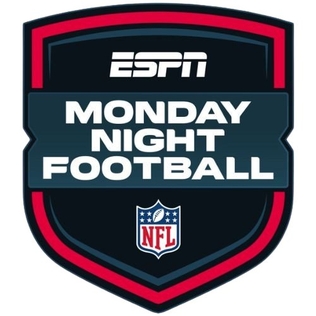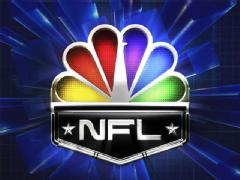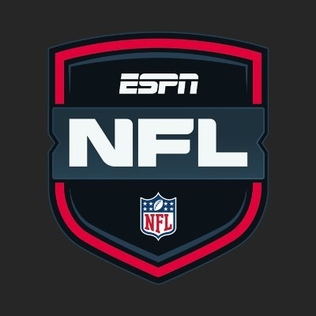This article needs additional citations for verification .(January 2012) |
The following is a list of the television networks and announcers who have broadcast the National Football League's Pro Bowl throughout the years.
This article needs additional citations for verification .(January 2012) |
The following is a list of the television networks and announcers who have broadcast the National Football League's Pro Bowl throughout the years.
| Year | Network | Play-by-play | Color commentator(s) |
|---|---|---|---|
| 1951 | not televised | ||
| 1952 | NBC | Harry Wismer | Bill Stern |
| 1953 | NBC | Bud Foster | Mark Scott |
| 1954 | DuMont | Tom Harmon | Red Grange |
| 1955 | not televised | ||
| 1956 | |||
| 1957 | |||
| 1958 | NBC | Joe Tucker | Van Patrick |
| 1959 | NBC | Jim Gibbons | Van Patrick |

Monday Night Football is the branding used for broadcasts of National Football League (NFL) games that primarily broadcast on Monday nights. It was originally broadcast on ABC from 1970 to 2005, before moving exclusively to sister network ESPN in 2006, which remains the main channel for the broadcast. In 2020, MNF returned to ABC in select simulcasts with ESPN, and in 2022, it began featuring select exclusive ABC telecasts. In addition, ESPN2 has aired alternate telecasts of selected games since 2020 as the Manningcast, while ESPN+ has streamed MNF simulcasts in the United States since 2021.

The National Football League All-Star Game (1939–1942), Pro Bowl (1951–2022), or Pro Bowl Games is an annual event held by the National Football League (NFL) featuring the league's star players.
The NFL on CBS is the branding used for broadcasts of National Football League (NFL) games that are produced by CBS Sports, the sports division of the CBS television network in the United States. The network has aired NFL game telecasts since 1956. From 2014 to 2017, CBS also broadcast Thursday Night Football games during the first half of the NFL season, through a production partnership with NFL Network.

The television rights to broadcast National Football League (NFL) games are the most lucrative and expensive rights of any sport in the world. Television brought professional football into prominence in the modern era after World War II. Since then, National Football League broadcasts have become among the most-watched programs on American television, and the financial fortunes of entire networks have rested on owning NFL broadcasting rights. This has raised questions about the impartiality of the networks' coverage of games and whether they can criticize the NFL without fear of losing the rights and their income.
ESPN on ABC is the branding used for sports event and documentary programming televised by the American Broadcasting Company (ABC) in the United States. Officially, the broadcast network retains its own sports division; however, in 2006, ABC's sports division was merged into ESPN Inc., which is the parent subsidiary of the cable sports network ESPN that is majority owned by ABC's corporate parent, The Walt Disney Company, in partnership with Hearst Communications.

The NFL on NBC is the branding used for broadcasts of National Football League (NFL) games that are produced by NBC Sports, and televised on the NBC television network and the Peacock streaming service in the United States.
The 2006 NFL season was the 87th regular season of the National Football League (NFL). Regular season play was held from September 7 to December 31, 2006.
ESPN Megacast, formerly known as ESPN Full Circle, is a multi-network simulcast of a single sporting event across multiple ESPN networks and services—with each feed providing a different version of the telecast making use of different features, functions or perspectives. These simulcasts typically involve ESPN's linear television channels and internet streaming platforms, and may occasionally incorporate other Walt Disney Television networks at once.
National television broadcasts of National Football League (NFL) games first aired on ABC from 1948 to 1951. Between 1970 and 2005, Monday Night Football aired exclusively on ABC. In 2006, ESPN took over as the exclusive rights holder to Monday Night Football, and the ABC Sports division was merged into ESPN Inc. by parent company Disney. Afterward, ABC did not broadcast any game from the NFL, whether exclusive or a simulcast from ESPN, until they simulcasted an NFL Wild Card playoff game in 2016. ABC would then return to Monday Night Football in 2020, when they aired three games as simulcasts from ESPN.
The following article details the history of Monday Night Football, the weekly broadcast of National Football League games on U.S. television.
The history of the National Football League on television documents the long history of the National Football League on television. The NFL, along with boxing and professional wrestling, was a pioneer of sports broadcasting during a time when baseball and college football were more popular than professional football. Due to the NFL understanding television at an earlier time, they were able to surpass Major League Baseball in the 1960s as the most popular sport in the United States. Today, NFL broadcasting contracts are among the most valuable in the world.

The 2020 Pro Bowl was the National Football League's all-star game for the 2019 NFL season. It was played on January 26, 2020, at Camping World Stadium in Orlando, Florida, and was televised nationally by ESPN, while being simulcast on ABC and Disney XD.
During the early 1960s, NFL Commissioner Pete Rozelle envisioned the possibility of playing at least one game weekly during prime time that could be viewed by a greater television audience. An early bid by the league in 1964 to play on Friday nights was soundly defeated, with critics charging that such telecasts would damage the attendance at high school football games. Undaunted, Rozelle decided to experiment with the concept of playing on Monday night, scheduling the Green Bay Packers and Detroit Lions for a game on September 28, 1964. While the game was not televised, it drew a sellout crowd of 59,203 spectators to Tiger Stadium, the largest crowd ever to watch a professional football game in Detroit up to that point.
NBC made history in the 1980s with an announcerless telecast, which was a one-shot experiment credited to Don Ohlmeyer, between the Jets and Dolphins in Miami on December 20, 1980), as well as a single-announcer telecast, coverage of the Canadian Football League during the 1982 players' strike, and even the first female play-by-play football announcer, Gayle Sierens.
On March 12, 1990, at the NFL's annual meeting in Orlando, Florida, the league new ratified four-year television agreements for the 1990 to 1993 seasons involving ABC, CBS, NBC, ESPN and TNT. The contracts totaled US$3.6 billion, the largest package in television history. This contract saw each network having rights to one Super Bowl telecast as part of the package. The fourth Super Bowl (XXVIII) was up for a separate sealed bid. NBC won the bid, and since they were last in the rotation for Super Bowl coverage in the regular contract, ended up with two straight Super Bowls. CBS is the only other network to televise two Super Bowls in a row. NBC, which had held XXVII, was the only network to bid on XXVIII. Previously, the league alternated the Super Bowl broadcast among its broadcast network partners, except for Super Bowl I; CBS broadcast Super Bowl II, then the league rotated the broadcast between CBS and NBC until 1985 when ABC entered the rotation when that network broadcast Super Bowl XIX.
Recently, the NFL's TV broadcasters have suffered annual financial losses because advertising revenue is unable to keep up with the rising costs of broadcast rights.
From 2014 to 2022, CBS, NBC, and Fox, as well as cable television's ESPN, paid a combined total of US$20.4 billion will pay $39.6 billion for exactly the same broadcast rights. The NFL thus holds broadcast contracts with four companies that control a combined vast majority of the country's television product. League-owned NFL Network, on cable television, also broadcasts a selected number of games nationally. In 2017, the NFL games attracted the top three rates for a 30-second advertisement: $699,602 for NBC Sunday Night Football, $550,709 for Thursday Night Football (NBC), and $549,791 for Thursday Night Football (CBS).

The NFL on ESPN is the branding used for broadcasts of National Football League (NFL) coverage on the networks of ESPN. NFL coverage first aired on the network in 1980, when ESPN broadcast the 1980 NFL draft. ESPN did not air live NFL games until 1987, when it acquired the rights to Sunday Night Football. In 2006, ESPN lost the rights to Sunday Night Football and began airing Monday Night Football instead.